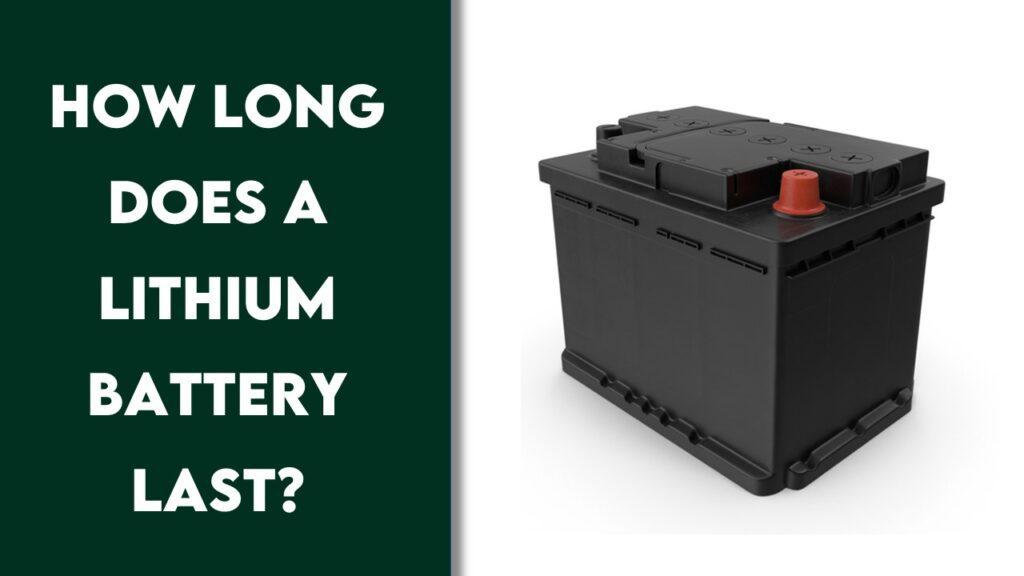
A lithium battery usually lasts between 5 to 15 years, depending on how often you use it, how deeply you discharge it, and how well you take care of it. Most lithium batteries can handle around 2,000 to 5,000 charge cycles before their capacity starts to drop. That’s why they’re popular in solar systems, electric tools, and backup power setups.
In this article, we are going to explain what affects a lithium battery’s lifespan, how to get the most use out of it, and the signs that it might be time for a replacement. Whether you’re using one for your home, RV, or power station, understanding how long it lasts can help you plan ahead and avoid surprises.
What is the Typical Lifespan of Lithium Batteries?
When thinking about how long a lithium battery lasts, it’s important to understand that the lifespan can vary widely. The type of battery, how you use it, and how well you take care of it all play a role. On average, most lithium batteries can last anywhere from 2 to 10 years. However, this range isn’t the same for every battery type. Let’s break down what influences these numbers so you can get the most out of your battery.
Cycle Life of Lithium Batteries
The lifespan of a lithium battery is often measured in cycles. A cycle is simply one full charge and discharge of the battery. Over time, as you go through these cycles, the battery’s ability to hold a charge starts to decline. Most lithium batteries have a cycle life of 300 to 500 cycles, which usually translates to 2 to 5 years of regular use. But, not all lithium batteries are created equal. For example, Lithium Iron Phosphate (LiFePO4) batteries can last much longer, sometimes up to 15 years, thanks to their higher cycle life.
Expected Lifespan in Years
Different types of lithium batteries offer different lifespans. For instance, Li-ion batteries, which are common in phones and laptops, generally last between 2 to 10 years. LiFePO4 batteries, often found in solar power systems and electric vehicles, can last 5 to 15 years. Lithium batteries are also commonly used in RVs, where long life and reliability matter most on the road. On the other hand, Lithium Polymer (LiPo) batteries, used in drones and RC vehicles, electri scooters, might last only 2 to 5 years. Understanding these differences helps you plan for replacements and get the most out of your batteries.
By knowing the typical lifespan and cycle life of lithium batteries, you can better manage your devices and avoid unexpected battery failures. This knowledge is key to ensuring that your devices continue to run smoothly for years to come.
Factors Influencing Lithium Battery Lifespan
Now that you know how long a lithium battery typically lasts, it’s time to dive into what affects that lifespan. From temperature to how you charge your battery, several factors can either extend or shorten the life of your lithium battery. Understanding these factors will help you take better care of your batteries and ensure they last as long as possible.
Temperature Extremes
Temperature plays a huge role in how long your lithium battery lasts. High temperatures can cause the battery to degrade faster, while extremely low temperatures can reduce its performance. For the best results, keep your batteries in a cool, dry place. Avoid exposing them to direct sunlight or freezing conditions. By maintaining a stable temperature, you can significantly extend the lifespan of your battery.
Depth of Discharge (DoD)
The depth to which you discharge your battery also matters. Shallow discharges, where you only use a small portion of the battery’s capacity, can help it last longer. On the other hand, deep discharges, where you drain the battery almost completely, can shorten its life. Aiming for partial discharges rather than fully draining your battery is a simple way to get more life out of it.
Charging Habits
How you charge your battery can make or break its lifespan. Rapid charging or charging to 100% too often can stress the battery and reduce its lifespan. Instead, try to charge your battery slowly and avoid leaving it plugged in once it’s fully charged. Following these habits will help maintain the battery’s health and keep it working longer.
Usage Patterns and Load
If you use your battery heavily or place a high load on it, it will wear out faster. High current draws, like running multiple high-power devices simultaneously, can accelerate battery degradation. Balancing your usage and avoiding unnecessary strain on the battery will help it last longer.
Quality of Battery Management System (BMS)
A good Battery Management System (BMS) is essential for keeping your lithium battery in top condition. The BMS controls charging, discharging, and other crucial functions, protecting the battery from damage. A high-quality BMS can extend the life of your battery by ensuring it operates within safe limits, avoiding overcharging, and balancing the cells correctly.
Storage Conditions
How you store your battery when it’s not in use can greatly impact its lifespan. Storing it in a fully charged or completely discharged state can cause it to degrade faster. For best results, store your lithium batteries at a partial charge (around 40-60%) in a cool, dry place. Proper storage conditions are key to preserving your battery’s health over the long term.
By understanding and managing these factors, you can greatly extend the life of your lithium batteries. It’s all about taking simple steps to protect your investment and ensure your devices stay powered for as long as possible.
How to Prolong the Lifespan of Lithium Batteries
Knowing how long a lithium battery lasts is one thing, but knowing how to extend that lifespan is even better. Proper care and maintenance can make a big difference in how long your battery serves you. From charging habits to storage, small changes can lead to significant improvements. Let’s explore the best practices that can help you get the most out of your lithium battery.
Avoid Extreme Temperatures
Extreme heat or cold can shorten your battery’s lifespan. High temperatures speed up the chemical reactions inside the battery, causing it to wear out faster. Cold temperatures, on the other hand, can reduce the battery’s efficiency. To keep your battery healthy, try to store and use it in moderate temperatures. Avoid leaving it in places like a hot car or a freezing garage.
Use Partial Discharges
Instead of fully draining your battery every time, aim for partial discharges. Lithium batteries don’t need to be completely drained before recharging, and doing so can actually harm them. By keeping the battery charge between 20% and 80%, you can reduce the stress on the battery and help it last longer.
Optimal Charging Practices
Charging your battery properly is key to extending its life. Use the charger that came with the battery, or one that is specifically designed for it. Avoid overcharging, as it can cause the battery to overheat and degrade. Also, slow charging is better than rapid charging, as it reduces the stress on the battery. Following these simple charging tips can make a big difference in how long your battery lasts.
Proper Storage Techniques
When you’re not using your lithium battery, storing it correctly is crucial. Keep it in a cool, dry place, and try to store it at a partial charge—around 40% to 60% is ideal. Storing it fully charged or completely drained can lead to faster degradation. Proper storage conditions can preserve your battery’s health and ensure it’s ready when you need it.
Regular Use and Rotation
If you have multiple batteries, rotating their use can help prevent any one battery from sitting unused for too long. Regularly using your lithium battery helps keep it in good condition. Batteries that are left unused for extended periods can lose their ability to hold a charge. So, if you have spare batteries, make sure to use them periodically.
Use of Battery Management Systems (BMS)
A Battery Management System (BMS) is a crucial tool for maintaining your battery’s health. The BMS monitors and controls the battery’s charging and discharging processes, protecting it from overcharging, over-discharging, and other potential issues. If your battery comes with a BMS, make sure it’s functioning properly. A well-maintained BMS can greatly extend the life of your lithium battery.
By following these tips, you can maximize the lifespan of your lithium batteries. It’s all about taking a few simple steps to care for them properly, ensuring they last as long as possible and provide reliable power when you need it.
Do Lithium Batteries Last Longer Than Other Types of Batteries?
Lithium batteries have become the go-to choice for many, and there’s a good reason for that—they generally last longer than other types of rechargeable batteries. Whether you’re comparing them to lead-acid batteries, nickel-cadmium (NiCd) batteries, or nickel-metal hydride (NiMH) batteries, lithium batteries typically offer superior performance and longevity. Let’s take a closer look at how they stack up against these other options.
Comparison with Lead-Acid Batteries
Lead-acid batteries have been around for a long time, but they don’t hold a charge as well as lithium batteries. On average, a lead-acid battery lasts about 500 to 1,000 cycles, whereas a lithium battery can last 3,000 to 5,000 cycles or more. This means lithium batteries can last several times longer than lead-acid batteries, making them a more cost-effective choice in the long run. Additionally, lithium batteries are lighter, charge faster, and don’t require as much maintenance.
Comparison with Nickel-Cadmium (NiCd) and Nickel-Metal Hydride (NiMH) Batteries
Nickel-cadmium batteries are known for their memory effect, where they lose capacity if not fully discharged regularly. Lithium batteries don’t have this problem, which makes them easier to maintain. While NiCd batteries typically last for about 1,000 cycles, lithium batteries can last several times longer. Nickel-metal hydride batteries offer a slight improvement over NiCd in terms of cycle life, but they still fall short compared to lithium batteries. Lithium’s longer cycle life, higher energy density, and lower self-discharge rate make it the superior choice for most applications.
Advantages of Lithium Batteries Over Other Types
The advantages of lithium batteries go beyond just lifespan. They offer a higher energy density, meaning they can store more energy in a smaller space. They also have a lower self-discharge rate, so they hold their charge longer when not in use. Additionally, lithium batteries are more environmentally friendly, as they don’t contain harmful substances like cadmium, which is found in NiCd batteries.
Lithium batteries not only last longer than other types of batteries but also offer numerous other benefits. Whether you’re powering a small device or a large system, lithium batteries provide reliable, long-lasting power that outperforms the competition.
Which Type of Lithium Battery Lasts the Longest?
When choosing a lithium battery, understanding which type offers the longest lifespan is key to making the right decision. Not all lithium batteries are the same, and some are better suited for long-term use than others. Let’s explore the different types of lithium batteries and see which ones last the longest.
Lithium Iron Phosphate (LiFePO4)
Lithium Iron Phosphate (LiFePO4) batteries are known for their durability and safety. They have a long lifespan, often lasting between 5 to 15 years, depending on usage. These batteries can handle more charge-discharge cycles than most other lithium batteries—up to 3,000 to 5,000 cycles. That’s why they are often used in applications where longevity is critical, such as solar energy systems, electric vehicles, and backup power supplies. Additionally, LiFePO4 batteries are less prone to overheating, making them a reliable choice for long-term use.
Lithium Titanate (LTO)
Lithium Titanate (LTO) batteries are another type with an exceptional lifespan. These batteries can last up to 20 years, with some models rated for tens of thousands of cycles. LTO batteries are commonly used in electric vehicles, grid storage, and other high-demand applications where longevity and safety are crucial. While they are more expensive than other lithium batteries, their ability to withstand extreme conditions and high cycle counts makes them a worthwhile investment for long-term use.
Lithium-Ion (Li-ion)
Lithium-Ion (Li-ion) batteries are the most common type, found in everything from smartphones to laptops to electric vehicles. On average, they last between 2 to 10 years, depending on the specific chemistry and how they are used. While they don’t last as long as LiFePO4 or LTO batteries, they offer a good balance between cost, energy density, and lifespan. Li-ion batteries are ideal for everyday electronics, where high energy density and lightweight are important.
By understanding the strengths of each type of lithium battery, you can choose the one that best fits your needs. If longevity is your top priority, LiFePO4 and LTO batteries are your best options. However, for everyday use, Li-ion batteries still offer a solid lifespan and excellent performance.
Which Type of Lithium Battery Has the Shortest Lifespan?
While lithium batteries generally last longer than other types of rechargeable batteries, not all of them are built to last equally. Some lithium batteries have a shorter lifespan due to their chemistry or intended use. Knowing which types have the shortest lifespan can help you avoid them if durability is a key concern.
Lithium Polymer (LiPo)
Lithium Polymer (LiPo) batteries are known for their flexibility and lightweight design, making them popular in drones, RC vehicles, and other portable devices. However, they typically have a shorter lifespan, lasting only 2 to 5 years with regular use. LiPo batteries are more sensitive to charging practices and temperature extremes, which can shorten their lifespan. While they are great for applications requiring lightweight and flexible batteries, they are not the best choice if longevity is a priority.
Lithium Manganese Oxide (LiMn2O4)
Lithium Manganese Oxide (LiMn2O4) batteries, often used in power tools and medical devices, also have a relatively shorter lifespan. These batteries typically last between 3 to 7 years, depending on usage patterns. While they offer high power output and safety features, their cycle life is lower compared to other lithium chemistries. If you need a battery for high-drain applications, LiMn2O4 might be a good choice, but don’t expect it to last as long as LiFePO4 or LTO batteries.
Nickel-Cadmium (NiCd)
While not a lithium battery, it’s worth mentioning that Nickel-Cadmium (NiCd) batteries, an older technology, have a much shorter lifespan than modern lithium batteries. NiCd batteries are prone to the “memory effect,” where their capacity decreases if not fully discharged before recharging. They are less common today, having been mostly replaced by more efficient lithium-based alternatives.
While all lithium batteries offer advantages over older battery types, LiPo and LiMn2O4 batteries tend to have shorter lifespans compared to other lithium chemistries. If you prioritize a long-lasting battery, it’s best to consider other types like LiFePO4 or LTO, which offer far greater durability and lifespan.
Final Thoughts!
To wrap things up, knowing how long a lithium battery lasts and what impacts its lifespan can really help you make the most of your devices. Different types of lithium batteries have varying lifespans, and understanding these differences can guide you in choosing the right battery for your needs. Whether it’s for your phone, car, or home, taking good care of your battery can extend its life significantly.
Simple actions like avoiding extreme temperatures, not fully draining the battery, and charging it correctly can make a big difference. Plus, selecting a battery with a longer lifespan, like LiFePO4 or LTO, can be a smart investment that pays off over time. A little effort goes a long way in keeping your battery running smoothly.
In the end, lithium batteries are dependable and long-lasting, but how well they perform over time depends on how you treat them. By following the tips in this guide, you can help ensure your battery stays strong and reliable, giving you the best bang for your buck.
Related FAQs
How Long Do Lithium Batteries Last In Storage?
Lithium batteries can last 3 to 6 years in storage if kept in a cool, dry place with a partial charge.
Do Lithium Batteries Degrade Over Time?
Yes, lithium batteries degrade over time due to chemical reactions, even if not used regularly.
Can You Extend The Lifespan Of A Lithium Battery?
Yes, by avoiding extreme temperatures, overcharging, and deep discharges, you can extend its lifespan.
What Affects The Lifespan Of A Lithium Battery?
Temperature, charging habits, and depth of discharge are the main factors affecting the lifespan of a lithium battery.
Are Lithium Batteries Better Than Lead-Acid Batteries?
Yes, lithium batteries last longer, charge faster, and require less maintenance than lead-acid batteries.

Matt Riggins has spent years working with generators, solar panels, transfer switches, batteries, fuel setups, and circuit wiring. He’s the guy friends and neighbors call when the power goes out or something just won’t run right. From off-grid installs to fixing up old or new portable units, he’s been through it all. Alan doesn’t just talk theory, he’s out there solving real problems and helping people keep their systems running when it matters most.




